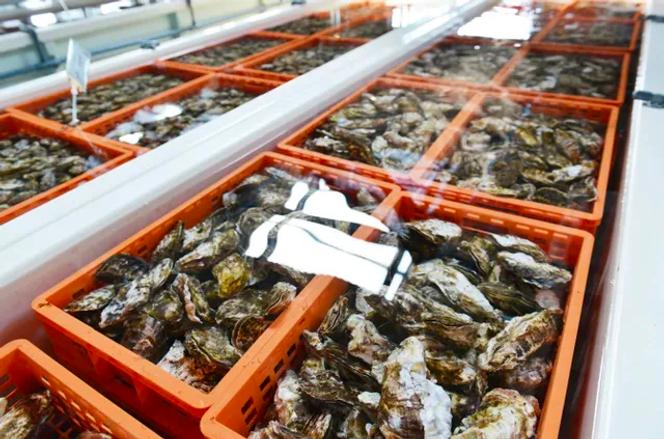


A small office in a gray prefab, a greenhouse with ponds and a mysterious gray-and-white concrete building. A stone's throw from the turquoise waters of the East China Sea, these austere facilities built on the coast of the small island of Kumejima, in the far south of Japan, are home to a veritable oyster farming revolution. GO Farm, a subsidiary of the Japanese company General Oyster (GO), is using deep-sea water to produce virus-free oysters with a programmable taste that have never been immersed in the sea.
It has taken 10 years of research to develop a technique for the onshore production of these oysters dubbed "8th Sea Oyster 2.0" – the "8th sea" describes deep waters, which are added to the seven seas of the legends of Antiquity and the Middle Ages. The challenge was to provide sufficient water circulation, adequate food and optimal temperature management, all at low cost. The innovations have led to patents in several countries, including Japan and the USA. Unveiled this summer, the new-generation oyster is said by experts to have a "very mild" taste.
The project was born of lessons learned from General Oyster's near-bankruptcy. In 2003, GO opened an oyster bar in Tokyo's upmarket Akasaka district. It was such a success that the company opened others all over Japan – it still has 26 today. In 2006, Japan's oyster farms were hit by a norovirus epidemic. Many customers fell ill, the bars were deserted and the company was on the verge of bankruptcy.
"We depended on the producers. There was nothing we could do, so we decided to process our own oysters," said Kyoko Washiashi, then in charge of customer relations, now in charge of operations at Kumejima. "By eliminating the risk of poisoning, we are opening up promising business opportunities," said Hidenori Yoshida, the company's director general, whose sales reached 3.7 billion yen (24 million euros) and operating profit 128 million yen in the fiscal year to the end of March.
General Oyster has opted for purification using seawater drawn from a depth of over 200 meters, as it contains no viruses. The company launched this activity in July 2014 in Nyuzen, Toyama Prefecture, on the coast of the Sea of Japan. Keeping oysters in a tank containing deep-sea water for 48 hours reduces the number of bacteria such as E. coli and Vibrio below the standards set by the company, which are stricter than those of the Food Hygiene Law. Every year, the company sells over six million of these oysters, dubbed "8th Sea Oyster 1.0".
You have 40% of this article left to read. The rest is for subscribers only.
